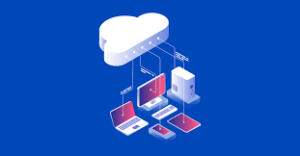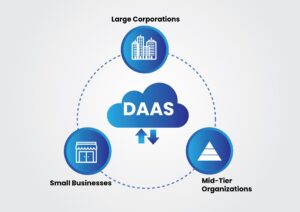Data-as-a-service (DAAS) is a big data and analytics offering that enables companies to tap into the largest potential for meaningful analytics, by providing on-demand access to the largest platforms in the industry. DaaS consulting makes it easy for any company with data needs to get customized solutions from its different providers. With a wide range of accessible services from simple acquisition to complex configuration, DaaS allows companies to hone in on specific services for acquiring and cleansing their data, building predictive models around it, and analyzing the results. This also means shorter timeframes for companies in every stage of their analytics process to come up with valuable insights.
In this blog, we will discuss the overview of DaaS, the advantages and challenges that come with DaaS implementation.
What is Data as a Service?

“Data-as-a-Service” is a relatively new concept. DaaS is an all-inclusive, cost-effective and highly flexible way to get the data you need to make your business more efficient, agile and profitable. The technology industry has been turning businesses on their heads for years, and it’s no different in the data sector. If you’re looking at ways to improve your own business’ efficiency, agility, or profitability, DaaS platforms could be the answer for you. With DaaS, you can create a customized solution tailored to your needs.
DaaS defines how an organization will store and access its data. Instead of paying the traditional upfront cost of purchasing hardware and software while also dealing with expensive maintenance fees, businesses can now “rent” the hardware and software they need as well as the employees who know how to use it. DaaS platforms allows businesses to more easily integrate disparate systems into a seamless whole where data can move freely without being trapped by systems that were not created with each other in mind.
It can also be known as a data management strategy businesses use, which utilizes the Oracle Cloud services description to provide data integration etc. using a network connection. It is an information provision and distribution model in which data files are available to users over the internet or any other network.
Important Components of DaaS
Collection Process
In this process, data is collected using the most efficient methods.
Aggregation Process
In this method, all the collected data is analyzed and only the most important data is separated.
Correlation Process
This process identifies the correlation between any two data sets.
Risk Tolerance
In this method, risk tolerance is identified of each data set for enhanced decision making.
Advantages of DaaS
There are lots of advantages that businesses can reap from implementing DaaS. The benefits includes:
Reduced Expense
These days, people use smart devices for work and personal use everyday. Google defines these moments as “micro-moments”. Businesses can leverage these moments to improve their decision making based on quality data.
With the help of predictive analysis, businesses curate custom experiences by understanding user needs accurately. By doing so, businesses can efficiently narrow their target audience and the reduce the load on the sales team. The whole process is beneficial in reducing man hours which reduces business overheads to a great extent.
Correct Analysis
Businesses that participate in agile operations, it is important to have accurate analysis for better results. These decisions are often driven by experience and not based on data alone. Humans can be biased and hence the decisions taken based on experience can reflect that. Due to this, businesses can lose a large amount of revenue by making wrong decisions which can be avoided by implementing DaaS.
New Business Avenues
Last but not the least, Data as a Service allows businesses to extend their product or service line by making the right use of available data. More often than not, these decisions are supported by precise analysis which drives business decision making by eliminating guesswork and offering the right product or service to the customer.
Limitations of DaaS
Apart from all the major advantages of DaaS, there are some limitations which must not be neglected for sustainability of an organization. Some of these limitations include:
Data Complexity
Managing the complexity of data is one of the most challenging aspects of DaaS. Due to the recent developments of DaaS, most first time users and even vendors do not have the clarity of managing this complexity which can be overwhelming. There is a specific gap to be filled which requires proper strategic planning to meet desired business goals.
Security
Businesses have this fear of their data being compromised when outsourcing it to a third party service provider. It can be a major compromising situation for the business and legislations in different countries handle it with utmost care, like GDPR in Europe. This data includes personal information like contact details, bank details etc. and hence it is important to mitigate any security threats to business critical data.
Which Organizations Should Outsource the Process?

Irrespective of the business size and nature of the business, data is one of the most crucial elements of any business and it is your duty to safeguard it for the best interest of the company. It is important to understand how this data is collected, stored and used in the organization. Each type of business can have a different use of data which is mentioned below.
Enterprises
In recent times, enterprises or large scale organizations have used data intelligently to make great progress and gain a competitive advantage. It is very similar to the process of small and medium businesses. However, for enterprises there is an added layer of features based on the scale and quantity of data to be managed. DaaS providers have a process of identifying the loopholes in the enterprise and devise a secure approach for the collection, storage and use of data in the organization based on the user’s hierarchy and need for data.
Medium Sized Organizations
In the growth phase of a business, full-time teams are required along with novel platforms for data collection, storage and management. When compared to the small sized businesses, these type of businesses have the resources and capabilities to manage data in-house. Now, they can choose to manage this data in-house or can outsource it to a reliable DaaS provider. By outsourcing this service, medium sized businesses can easily get access to analytics and reports pertaining to the use of data, different methods of data collection and manage large chunks of data efficiently.
Small Sized Businesses
These type of businesses generally have a single source of data collection, which can also work to their advantage while outsourcing their data management needs. For instance, all finance related data is managed by a CFO, unlike large enterprises where there is a layer of team members working on the same data. By accessing their services, small sized businesses can definitely gain a lot in terms of enhanced reporting, forecasting and taking their business to the next level.
Final Words
In other words, DaaS is set to transform the data landscape into one that’s more flexible, cost-effective, and efficient for businesses at every stage of their growth. Taking into consideration the high costs associated with maintaining a data lake on-premises, coupled with unpredictable and diminishing resources for IT departments in modern times, DaaS simply provides an all-in-one solution that’s set to take over in both the medium and long term.
You might also like: Oracle Cloud Services Description Platform
For more updates, follow us on LinkedIn.

